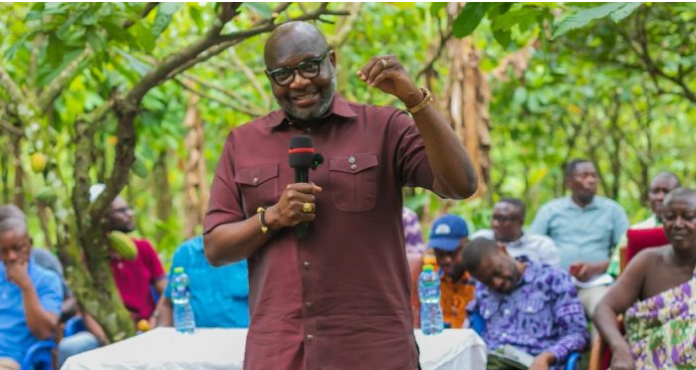The Chief Executive Officer of the Ghana Cocoa Board (COCOBOD), Dr. Ransford Anertey Abbey, has reiterated the board’s unwavering commitment to enhancing the welfare of cocoa farmers, despite ongoing challenges in the sector.
During a farmers’ rally at Attronso in the Sefwi Bekwai District, as part of his three-day maiden tour of the Western North Region, Dr. Abbey revealed that COCOBOD is actively considering a review of the producer price of cocoa for the 2025/2026 season.
“This is part of our broader effort to improve the livelihoods of farmers and make cocoa farming attractive to the youth,” he said.
“Despite our financial constraints, management is committed to offering cocoa farmers a better price for their produce.”
Dr. Abbey expressed concern over the ageing population of cocoa farmers, warning that it poses a threat to the sector’s long-term sustainability.
He stressed the need to modernize cocoa farming and introduce innovations that would attract younger people to the industry.
“To make cocoa farming more appealing, we’re working with the Ministry of Agriculture to provide modern tools and equipment,” he noted.
Dr. Abbey also announced plans to invest in irrigation systems to help cocoa farms adapt to erratic rainfall patterns.
He encouraged farmers to form cooperatives to benefit from these interventions more efficiently.
“It’s not feasible to implement irrigation for individual farmers. Cooperative farming is essential if we want to tackle the high costs and water access issues worsened by illegal mining,” he explained.
He also disclosed that COCOBOD is pushing for amendments to laws governing cocoa cultivation to better protect cocoa trees from environmental threats, especially from galamsey activities.
“Cocoa farming is a legacy of wealth for future generations. Strengthening legal protections for cocoa trees is crucial,” he stressed.
Dr. Abbey further assured farmers of the timely delivery of fertilizers and agrochemicals, warning against the diversion of these critical inputs.
“These inputs come at a great cost to support our farmers. Anyone caught in diversion activities will face the full consequences,” he cautioned.
READ ALSO:

